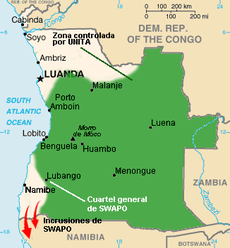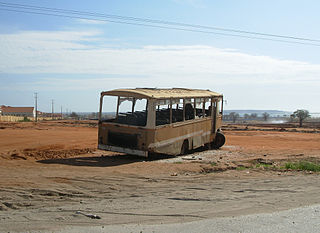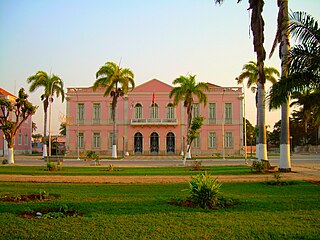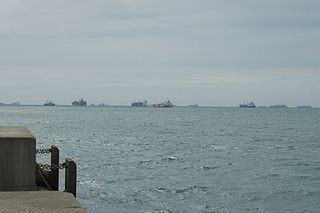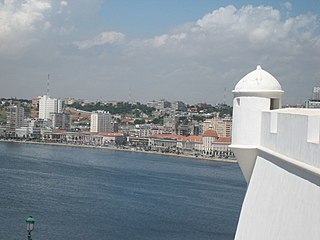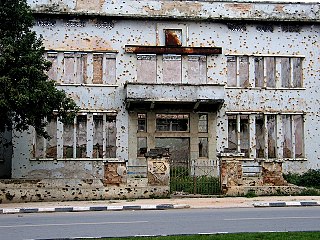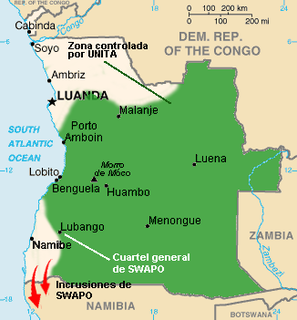| UN Security Council Resolution 1213 | |
|---|---|
UNITA territory during the civil war | |
| Date | 3 December 1998 |
| Meeting no. | 3,951 |
| Code | S/RES/1213 (Document) |
| Subject | The situation in Angola |
Voting summary | 15 voted for None voted against None abstained |
| Result | Adopted |
| Security Council composition | |
Permanent members | |
Non-permanent members | |
United Nations Security Council resolution 1213, adopted unanimously on 3 December 1998, after reaffirming Resolution 696 (1991) and all subsequent resolutions on Angola, including resolutions 846 (1993), 1127 (1997) and 1173 (1998), the Council extended the mandate of the United Nations Observer Mission in Angola (MONUA) for a final time until 26 February 1999. [1]

United Nations Security Council resolution 696, adopted unanimously on 30 May 1991, after noting the recent desire to sign the Bicesse Accords between the MPLA and UNITA in Angola, the recent withdrawal of all Cuban troops and considering a report by the Secretary-General, the Council approved Javier Pérez de Cuéllar's recommendations and established the United Nations Angola Verification Mission II, noting that the mandate of the United Nations Angola Verification Mission I (1989–1991) was coming to an end.

Angola, officially the Republic of Angola, is a west-coast country of south-central Africa. It is the seventh-largest country in Africa, bordered by Namibia to the south, the Democratic Republic of the Congo to the north, Zambia to the east, and the Atlantic Ocean to the west. Angola has an exclave province, the province of Cabinda that borders the Republic of the Congo and the Democratic Republic of the Congo. The capital and largest city of Angola is Luanda.

United Nations Security Council resolution 864, adopted unanimously on 15 September 1993, after reaffirming resolutions 696 (1991), 747 (1992), 785 (1992), 793 (1992), 804 (1993), 811 (1993), 823 (1993), 834 (1993) and 851 (1993), the Council noted the continuing situation in Angola and went on to condemn and place international sanctions on UNITA.
Contents
The Security Council condemned the failure of UNITA to implement the remaining tasks of the Lusaka Protocol including the demilitarisation of its forces and the extension of state administration throughout the country. It was concerned that the leader of UNITA, Jonas Savimbi, had not responded to proposals for the restoration of the peace process by the Special Representative of the Secretary-General. [2] There was a serious humanitarian impact brought about by the impasse in the peace process which had consequences on the security of the country.

The National Union for the Total Independence of Angola (UNITA) is the second-largest political party in Angola. Founded in 1966, UNITA fought alongside the Popular Movement for the Liberation of Angola (MPLA) in the Angolan War for Independence (1961–1975) and then against the MPLA in the ensuing civil war (1975–2002). The war was one of the most prominent Cold War proxy wars, with UNITA receiving military aid from the United States and South Africa while the MPLA received support from the Soviet Union and its allies.
The Lusaka Protocol, initialed in Lusaka, Zambia on October 31, 1994, attempted to end the Angolan Civil War by integrating and disarming UNITA and starting national reconciliation. Both sides signed a truce as part of the protocol on November 15.1994 and the treaty was signed on November 20, 1994
Demilitarisation or demilitarization may mean the reduction of state armed forces. For instance, the demilitarisation of Northern Ireland entailed the reduction of British security and military apparatuses. Demilitarisation in this sense is usually the result of a peace treaty ending a war or a major conflict. The principle is distinguished from demobilization, which refers to the drastic voluntary reduction in the size of a victorious army.
The resolution reiterated that the primary cause of the political crisis in Angola was due to the failure of UNITA to comply with its obligations under various peace agreements and Security Council resolutions. Furthermore, it demanded that it complete the demilitarisation of its forces and withdraw from territories it occupied through military means; there could be no military solution to the conflict and both parties were urged to seek a political settlement. Additionally, UNITA was urged to co-operate with MONUA in the withdrawal of MONUA personnel from Andulo and Bailundo. Law enforcement had to be strengthened and human rights respected.

Andulo is a town and municipality in Bié Province in Angola. The municipality covers an area of 10,316 square kilometres (3,983 sq mi), with about 319,000 inhabitants. It is bordered to the north by the municipality of Mussende, to the east by the municipalities of Luquembo and Nharea, to the south by the municipalities of Cunhinga, Mungo and Bailundo and west by the municipalities of Cela and Quibala.

Bailundo is a municipality and town in the province of Huambo, Angola.
The humanitarian situation continued to worsen, including the rise in the number of internally displaced persons, increased mine laying. The Angolan government and particularly UNITA were urged to guarantee the safety of United Nations and humanitarian personnel and permit humanitarian aid to be delivered to the affected population, cease mine laying activities and respect international humanitarian law.

A land mine is an explosive device concealed under or on the ground and designed to destroy or disable enemy targets, ranging from combatants to vehicles and tanks, as they pass over or near it. Such a device is typically detonated automatically by way of pressure when a target steps on it or drives over it, although other detonation mechanisms are also sometimes used. A land mine may cause damage by direct blast effect, by fragments that are thrown by the blast, or by both.

Humanitarian aid is material and logistic assistance to people who need help. It is usually short-term help until the long-term help by government and other institutions replaces it. Among the people in need are the homeless, refugees, and victims of natural disasters, wars and famines. Humanitarian aid is material or logistical assistance provided for humanitarian purposes, typically in response to humanitarian crises including natural disasters and man-made disaster. The primary objective of humanitarian aid is to save lives, alleviate suffering, and maintain human dignity. It may therefore be distinguished from development aid, which seeks to address the underlying socioeconomic factors which may have led to a crisis or emergency. There is a debate on linking humanitarian aid and development efforts, which was reinforced by the World Humanitarian Summit in 2016. However, the approach is viewed critically by practitioners.
International humanitarian law (IHL) is the law that regulates the conduct of war. It is that branch of international law which seeks to limit the effects of armed conflict by protecting persons who are not participating in hostilities, and by restricting and regulating the means and methods of warfare available to combatants.
Finally, the Secretary-General Kofi Annan was requested to report back to the Council no later 15 January 1999 on the future of MONUA and the United Nations presence in Angola, and on ways of improving the effectiveness of sanctions imposed against UNITA in previous resolutions. [3]
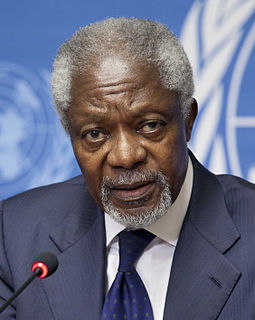
Kofi Atta Annan was a Ghanaian diplomat who served as the seventh Secretary-General of the United Nations from January 1997 to December 2006. Annan and the UN were the co-recipients of the 2001 Nobel Peace Prize. He was the founder and chairman of the Kofi Annan Foundation, as well as chairman of The Elders, an international organization founded by Nelson Mandela.
